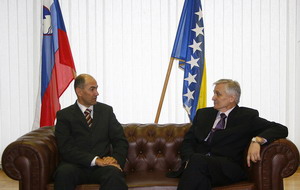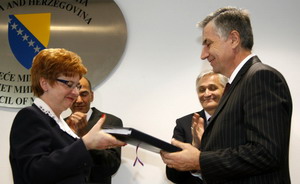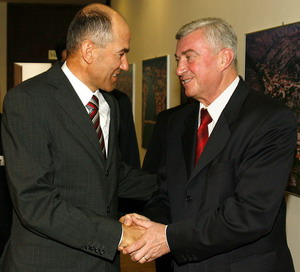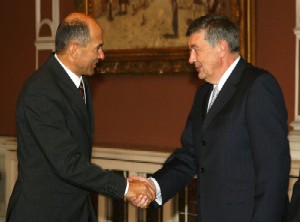The Prime Minister of the Republic of Slovenia, Janez Janša, visited Sarajevo today at the invitation by Nikola Špirić, the Chairman of the Council of Ministers of Bosnia and Herzegovina. The official visit, the first one of its kind since 1997, was aimed at strengthening political dialogue between the countries and bilateral relations, particularly in the economic sector.
The Prime Minister of Slovenia was welcomed at the airport with military honours by the host, the Chairman of the Council of Ministers of Bosnia and Herzegovina, Nikola Špirić. At the meeting which followed, the host and his guest agreed that the very good political and economic cooperation between Slovenia and Bosnia and Herzegovina was working well, and that the countries were collaborating on numerous other areas.

Prime Minister Janez Janša was welcomed by the host, the Chairman of the Council of Ministers of Bosnia and Herzegovina, Nikola Špirić (Photo: Srdjan Živulovič/BOBO)
Mr Janša said that bilateral trade and investment cooperation was increasing. According to Slovenian data, in the first eleven months of last year, trade in goods, which is comparable in volume with that between Slovenia and Russia, reached 730 million euros. In this period, Slovenia exported 442 million euros worth of goods and imported 288 million euros worth of goods. Imports form Bosnia and Herzegovina grew by more than 50 per cent, which signals a particularly positive trend toward balancing trade in goods. Both sides expressed great interest in further economic investments. Investments by Slovenian companies created over 7,000 jobs last year.
Prime Minister Janša congratulated his host on the progress his country has made. Mr Janša believes that Bosnia and Herzegovina will soon meet the criteria to sign the Stabilisation and Association Agreement with the EU. This is also significant for Slovenia, particularly in the light of its EU presidency in the first half of 2008, as one of the priorities of the presidency will be the European perspective of the countries of the Western Balkans.

Prime Minister Janez Janša and Chairman of the Council of Ministers of Bosnia and Herzegovina Nikola Špirić (Photo: Srdjan Živulovič/BOBO)
The Slovenian Prime Minister, Janez Janša, and the Chairman of the Council of Ministers of Bosnia and Herzegovina, Nikola Špirić, also agreed on making efforts to solve the issue of foreign currency deposits in the savings accounts of the former Ljubljanska banka in Sarajevo at expert level. At a joint press conference they stressed that this was an issue from the days of the former Yugoslavia. The Prime Minister of Slovenia emphasised that it was an issue pertaining to succession and that with regard to foreign currency deposits the wrong impression had sometimes been created that large sums had been transferred to Slovenia.
He stressed that in the former Yugoslavia foreign currency deposits had accumulated in the central bank of Yugoslavia, and for some time also through the central banks of individual republics; upon Slovenia's independence the balance sheet of Ljubljanska banka was negative. "These foreign currency deposits did not come to Slovenia and were never spent in Slovenia," he stressed, adding that the issue needed to be addressed with regard to those circumstances and the relevant legislation. "These deposits cannot be paid out of something which did not exist; they can only be paid from the resources negotiated within the succession agreement on the former SFRY," said the Slovenian PM. In 2004 the governments reached an agreement to form a group of experts to solve outstanding issues. The Slovenian PM stressed that he was not against continuing these joint sessions, but the facts cannot be changed.
On the occasion of the official visit to Sarajevo, the Minister of Labour, Family and Social Affairs, Marjeta Cotman, signed an agreement on social security which now needs to be ratified by the parliaments of both countries. The agreement regulates allowances, child and maternity benefits, pension budgets and the future of pensions. Although the agreement will demand substantial funds from Slovenia, it reflects the political will to strengthen relations, and is a sign of Slovenia's recognition of those Bosnians, Serbs, and Croatians in Bosnia and Herzegovina, whose work in Slovenia has contributed to the country's success story.

On the occasion of the visit an agreement on social security between the countries was signed (Photo: Srdjan Živulović/BOBO)
The Prime Minister of the Republic of Slovenia, Janez Janša, and the Chairman of the Council of Ministers of Bosnia and Herzegovina, Nikola Špirić, also opened a business forum attended by representatives of the business communities of both countries, including a delegation of some ninety businesspersons representing over seventy Slovenian companies and institutions. The PM took the opportunity to stress that, in view of its economic success, Slovenia has lately become a provider of development aid with particular focus on the Western Balkans. Slovenia has provided Bosnia and Herzegovina with development funds for projects facilitating smoother transition, the building of institutions, training, and approaching Euro-Atlantic integration. In addition, Slovenia has been active in multilateral development aid projects. It has been collaborating with the International Finance Corporation on implementing technical regulations and standards for small and medium-sized companies. In this way, Slovenia is striving to contribute to the further development of Bosnia and Herzegovina on its path to becoming a stable, uniform, independent, and economically successful country with territorial integrity.
As of November 2006, the total value of Slovenian investment in Bosnia and Herzegovina amounted to €322 million, which represents a tenth of all Slovenian foreign direct investments, making the country the fourth largest investor in Bosnia and Herzegovina. However, investment currents are no longer running in one way: the total value of investments by Bosnia and Herzegovina in Slovenia has already reached €32 million.
Slovenia's economy has been attracting more and more investors from Bosnia and Herzegovina, who know Slovenia very well, and because of their contacts with investors from the Arab world, can play a vital role as links between Arab capital and the Slovenian economy.

Prime Minister Janez Janša met with President of the House of Representatives of the Parliamentary Assembly of Bosnia and Herzegovina Beriz Bekić (Photo: Srdjan Živulović/BOBO)
As part of the official one-day visit, Mr Janša also met the President of the House of Representatives of the Parliamentary Assembly of Bosnia and Herzegovina, Beriz Bekić, Presidency members, and representatives of Slovenes living in Bosnia and Herzegovina.

Prime Minister Janez Janša met with Chairman of the Presidency of Bosnia and Herzegovina Nebojša Radmanović (Photo: Srdjan Živulović/BOBO)
Late in the afternoon, the Slovenian PM opened the "Argeta Sarajevo" factory owned by Droga kolinska. The factory is the largest Slovenian and second largest foreign investment in Bosnia and Herzegovina in 2006. According to Mr Janša, because of its export potential and possible transfer of technology into the Arab world, the factory could be the first step towards a joint market presence of Slovenian and Bosnian-Herzegovinian businesses in third markets.